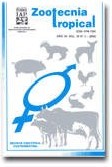
|
Zootecnia Tropical
Instituto Nacional de Investigaciones Agrícolas Venezuela
ISSN: 0798-7269
Vol. 29, No. 2, 2011, pp. 151-159
|
 Bioline Code: zt11012
Bioline Code: zt11012
Full paper language: English
Document type: Research Article
Document available free of charge
|
|
|
Zootecnia Tropical, Vol. 29, No. 2, 2011, pp. 151-159
| es |
Factores no genéticos que afectan el peso al nacer y destete de terneros Angus
Martínez-González, Juan Carlos; Gutiérrez-Michel, José Francisco; Briones-Encinia, Florencio; Lucero-Magaña, Froylán Andrés & Castillo-Rodríguez, Sonia Patricia
Resumen
Para determinar como influyen algunos factores no genéticos sobre el peso al nacer (PN) y destete (PD) ajustado
a 205 días (PDA) de terneros Angus, se analizaron 1.999 y 1.574 PN y PD, respectivamente. Todos los animales
se encontraban en pastoreo y fueron vacunados contra enfermedades enzooticas cada 6 meses. Los datos fueron
estudiados a través de un análisis de varianza por la metodología de mínimos cuadrados con un modelo que
incluyó los efectos fijos: año de nacimiento (AN = 1991-2007), época de nacimiento (EN = Fría, Seca y Lluviosa),
número de parto (NP = 1, 2, 3,…, 9 ó más partos), sexo (S = Machos y Hembras) y las interacciones AN xEN,
AN x NP y AN x SX. Todos los efectos resultaron altamente significativos (P < 0,01). Los promedios ± desviación
estándar fueron 36,2 ± 2,6 y 186,8 ±30,0 kg, respectivamente. La diferencia entre el mejor (2007) y peor año
(1991) para PN fue 6,0 kg. Vacas de 1, 2 y ≤9 partos parieron y destetaron en promedio terneros menos pesados.
Los terneros machos fueron más pesados que las hembras al nacimiento y destete. Las interacciones entre AN con
EN y NP de la vaca fueron importante para PN, pero se observó que la dirección y magnitud del efecto no son
constantes. Similarmente, la interacción entre AN con EN, con NP de la vaca y sexo del ternero afectaron el PDA,
sin poderse definir alguna tendencia o magnitud. Todos los factores no genéticos estudiados fueron importantes.
Palabras-clave
peso al nacimiento, peso al destete, ganado para carne.
|
| |
| en |
Non-genetic factors affecting birth and weaning weight in Angus calves
Martínez-González, Juan Carlos; Gutiérrez-Michel, José Francisco; Briones-Encinia, Florencio; Lucero-Magaña, Froylán Andrés & Castillo-Rodríguez, Sonia Patricia
Abstract
To determine the influence of some non-genetic factors on birth (BW) and weaning weight corrected to 205
d (WWA) of Angus calves, 1,999 and 1,574 weights were analyzed. All the animals were grazing and they
were vaccinated against enzootic every six months. The data was analyzed using an analysis of variance under
least squares methodology and the statistical model included: year of birth (YB = 1991-2007), season of birth
(SB = Cold, Dry and Rainy), parity number (PN = 1, 2, 3,… ≤9 calving) and sex (SX = Males and Females) and
the interactions YB x SB, YB x PN and YB x SX. All effects and the interactions affected BW and WWA (P <0,01).
The means and standard deviation were 36.2 ± 2.6 and 186.8 ± 30.0 kg, respectively. The differences between the
best years (2007) and worse year (1991) to BW was 1.1 kg. Cows of 1, 2 and ≤9 calving had calves less heavy.
Male calves weighted more than female to birth and weaning. The interactions that involved YB indicate that
the direction and magnitude of the effects are not constant within every year. The interaction YB x SB, YB x PN
and YB x SX were important on WWA without being possible to define some tendency or magnitude. All the
environmental effect studied was important.
Keywords
Angus cattle, environmental factors, birth and weaning weight.
|
| |
© Copyright 2011 - Zootecnia Tropical
Alternative site location: http://www.sian.inia.gob.ve/repositorio/revistas_ci/ZootecniaTropical/ztindice.htm
|
|
